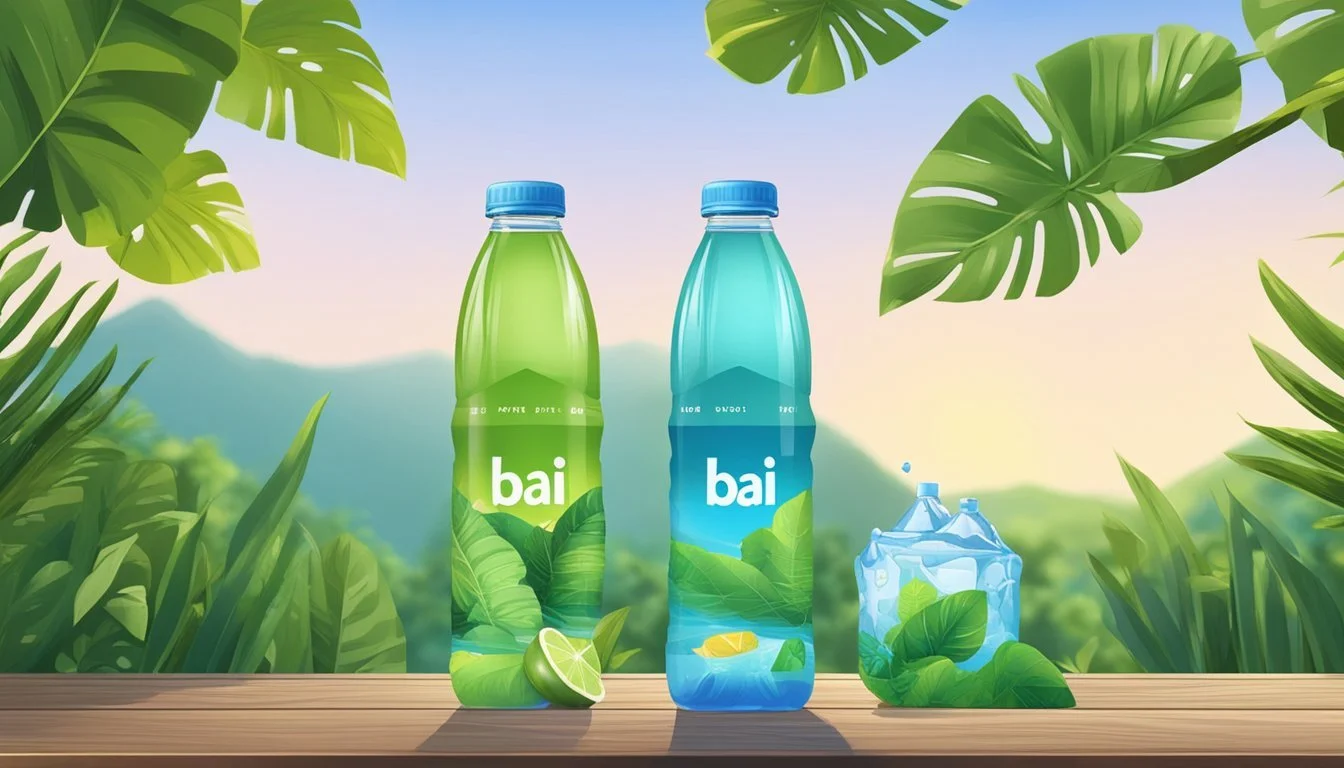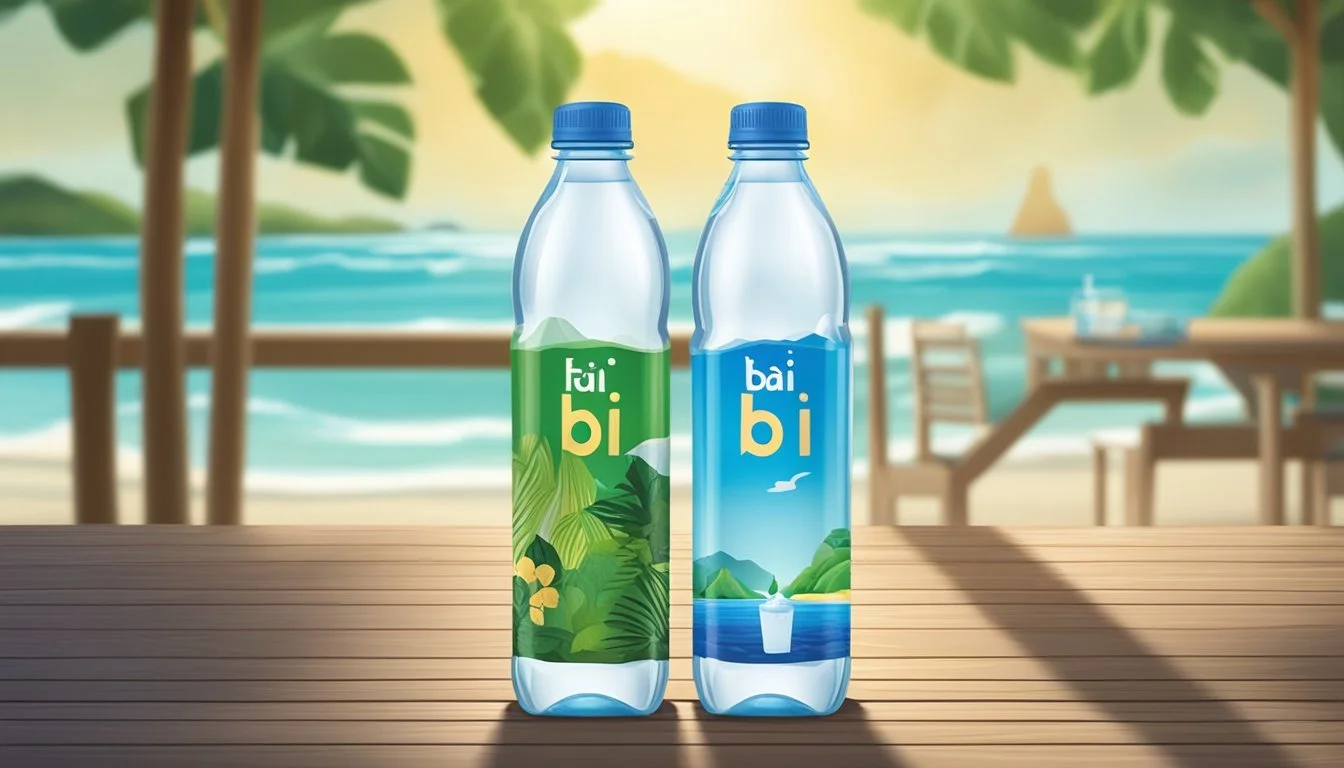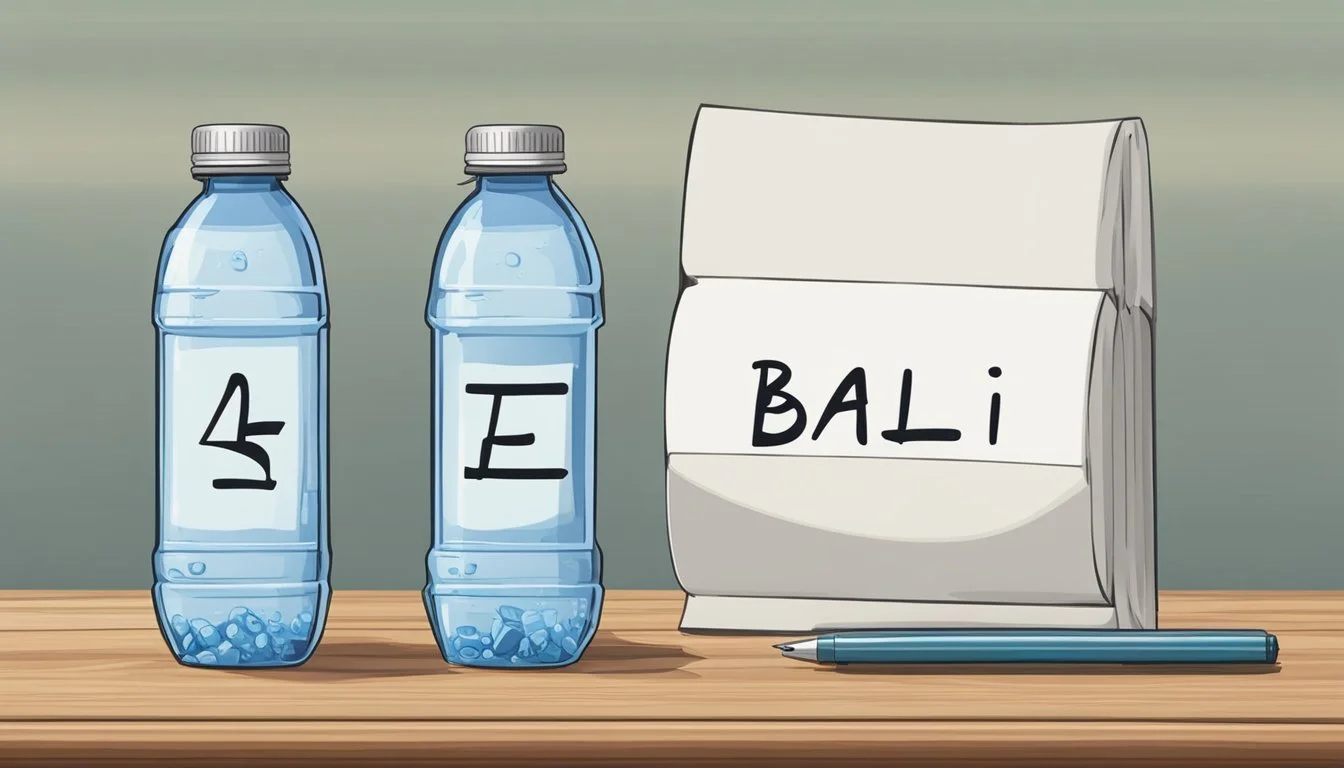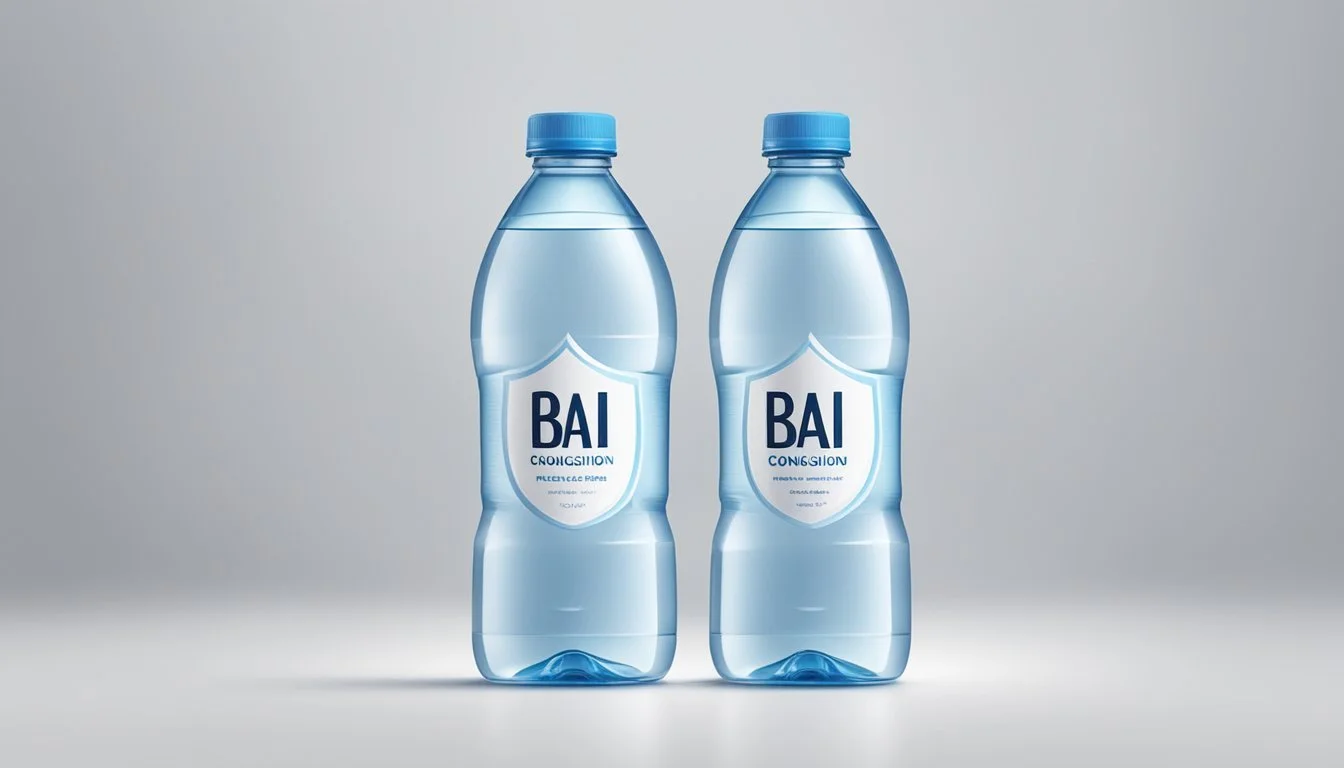Bai vs. Fiji
Comparing Quality and Taste in Bottled Water Brands
The bottled water market is increasingly diverse, with numerous brands vying for consumer attention. Among them, Bai and Fiji have emerged as popular choices, yet each brand offers a distinctly different approach to hydration. Bai, known for its antioxidant infusion and use of the coffee fruit, positions itself as a health-forward option, typically featuring added flavors and enhancements. Fiji Water, on the other hand, emphasizes its natural artesian source and purity, often marketing the untouched aspect of its water.
When considering Bai versus Fiji, consumers are not just comparing two bottled waters; they're evaluating contrasting philosophies of water consumption. Bai's added vitamins and exotic fruit flavors cater to those seeking functional beverages that promise more than simple hydration. Fiji's selling point is its soft, smooth taste and electrolyte content, which comes from a natural filtration process involving volcanic rock. The debate over which water is "better" is not just a matter of taste but also values—whether one prioritizes enhanced beverages or pure, unadulterated water.
As the bottled water industry continues to expand, the debate intensifies over the various merits of different brands. Bai and Fiji represent two prominent contenders in a crowded marketplace where consumers are increasingly mindful of the source, contents, and environmental impact of their bottled water. Understanding the nuances between these two brands is key for consumers aiming to make an informed choice that aligns with their health goals and personal ethics.
Background on Bottled Water
Bottled water has evolved into a ubiquitous commodity, with numerous brands competing and various types catering to consumer preferences.
Evolution of Bottled Water
The advent of bottled water can be traced back to the 17th century, yet its mass appeal accelerated in the 20th century. Initially seen as a luxury item, technological advancements and increased health awareness have led to its widespread consumption. From glass containers to eco-friendlier packaging options, bottled water has continuously adapted to the needs and concerns of consumers.
Popular Water Brands
The market has seen the emergence of multiple brands, each with a unique selling proposition. Fiji Water is renowned for its source in the artesian aquifers of Fiji. Other prominent names include the French-origin Evian, Smartwater with added electrolytes, and Dasani, known for its purification process. Aquafina and Nestle Pure Life are distributed widely, while choices such as Voss and San Pellegrino are positioned as premium options.
Types of Bottled Water
Bottled water varieties range from spring water, originating from natural springs, to purified water, which has been processed to remove chemicals and contaminants. Additionally, artesian water comes from wells that tap an aquifer, and mineral water, like Perrier and Mountain Valley Spring Water, contains natural minerals and trace elements. Conversely, tap water refers to municipally supplied water, which is subject to different standards and lacks the branding of bottled alternatives.
Bai and Fiji Water Comparison
In assessing Bai and Fiji water brands, one notices distinct differences in their origins, philosophies, product offerings, and market positions. Each brand presents a unique value proposition to health-conscious consumers, with varied approaches to hydration and wellness.
Company Origins and Brand Philosophy
Fiji Water was founded in 1996 and is extracted from an aquifer in the Fiji Islands. Fiji has positioned itself as a luxury product, often associated with a high-end lifestyle and has been frequently endorsed by celebrities. It stands out due to its source, touted as untouched by man until you unscrew the cap. Fiji's brand philosophy emphasizes purity and a connection to natural Earth, positioning itself as a country's biggest export and a key player in the premium water market.
Bai Water, on the other hand, is a relatively newer brand, founded by Ben Weiss in 2009. Its claim to fame is its antioxidant-infused drink, made from the Bai5, a formula that includes coffee fruit and white tea extract. Targeted towards health-conscious individuals, Bai's philosophy revolves around offering flavored bottled water that's not only hydrating but also adds a nutritional edge. Jaden Smith has notably collaborated with Bai on projects, enhancing its appeal to a younger demographic who values sustainability and innovation.
Product Range and Varieties
Fiji Water primarily offers natural artesian water in various sizes, ensuring a consistent taste profile across its range. For Fiji, the differentiator is their water's soft mouthfeel and high silica content, which contribute to its unique taste. Their products are unflavored, aligning with their brand philosophy of natural purity without additives.
Bai Water presents a broad product range that includes drinks infused with a myriad of fruity flavors such as Brasilia Blueberry, Malawi Mango, and Panama Peach, all fortified with antioxidants. The brand stands out not just for its flavored bottled water, but also for its energy drinks and teas, targeting consumers looking for flavorful hydration options with added health benefits like minimal sugar content and low calories.
Both brands distinguish themselves with their unique philosophies and product offerings, making their comparison more a matter of consumer preference and values than a straightforward quality assessment.
Health and Nutrition
In examining the benefits of Bai and Fiji bottled water, one must consider water quality, the nutritional content, and overall health impacts. The following subsections provide a detailed look at each of these areas to inform consumer choice.
Water Quality and Contaminants
Both Bai and Fiji brand waters undergo filtration and processing to meet safety standards. Fiji touts its source as a natural artesian aquifer in the remote Fiji Islands, which theoretically reduces the likelihood of contamination from industrial or agricultural sources. Contaminants such as heavy metals are a concern for any water source, but there has been no indication that Fiji water contains significant levels. Bai water is purified and infused with additives for flavor and is also subject to quality controls to minimize contaminants.
Nutritional Content and Benefits
The nutritional content of water is typically measured by its mineral and electrolyte levels. Fiji Water is known for its natural mineral content, including:
Magnesium: 14.7 milligrams per liter (mg/L)
Calcium: 17.9 mg/L
Potassium: 4.9 mg/L
Silica: 93.4 mg/L
Sodium: 17.8 mg/L
These minerals can contribute to the health benefits of Fiji water, offering electrolytes that support hydration and bodily functions.
Bai beverages, on the other hand, focus on low-calorie hydration with added antioxidants, typically featuring:
1 gram of sugar per bottle
Just 10 calories
No artificial sweeteners or added sugar
Antioxidants from coffee fruit extract and tea extract
Gluten-free composition
Comparing Health Impacts
When comparing Fiji water and Bai beverages, consumers must weigh their needs for hydration with mineral benefits against a desire for low-calorie flavored water with antioxidants. While Fiji offers a range of minerals and a higher calorie count due to its natural source, Bai provides a low-calorie alternative that includes beneficial antioxidants. Neither should replace regular water intake, but both can be part of a healthy diet when consumed in moderation and as part of a balanced hydration strategy. It is crucial to consider the individual health needs and dietary goals when choosing between the two.
Taste Profile
When assessing the taste profiles of Bai and Fiji bottled water, one navigates a landscape where the nuances of taste are as crucial as the quality of the water itself. Bai is known for its flavored waters that incorporate added sweeteners, while Fiji delivers a more natural taste from its source in the Fijian aquifer.
Analyzing Water Taste
Fiji water is sourced from an artesian aquifer located in the remote Fiji Islands. This source contributes to a unique mineral profile, which includes silica, calcium, and magnesium, giving Fiji water its distinct soft, smooth taste with no aftertaste. The absence of added flavors or sweeteners means that Fiji's taste remains unaltered, offering consumers the pure taste of natural water.
Flavor Additions and Purification Effects
Bai, on the other hand, offers a selection of waters enhanced with natural flavors and sweetened with Erythritol and Stevia Leaf extract. These flavor additions create a taste experience that differs markedly from traditional bottled water. The company aims to provide a range of exotic fruit flavors without the caloric intake associated with added sugar. The purification process for Bai waters ensures a clean slate onto which these natural flavors and sweeteners are added, resulting in a beverage that is both flavorful and low in calories.
Packaging and Sustainability
In the world of bottled water, the materials used for packaging and the sustainability practices of brands are pivotal factors in determining their environmental footprint.
Bottle Materials and Environmental Impact
Bai typically packages its flavored water beverages in PET bottles. PET, or polyethylene terephthalate, is a type of plastic that is widely recycled but still contributes to plastic waste if not properly disposed of. Bai water bottles are single-use, designed for convenience and portability, but this also implies that they require constant production and recycling to mitigate environmental impact.
In contrast, Fiji Water has recently made substantial steps towards sustainability by transitioning its iconic 500 mL and 330 mL bottles in the U.S. to 100% recycled plastic (rPET). The switch to rPET significantly reduces the dependency on virgin plastic resources and lowers the brand's carbon footprint. Fiji Water has set an ambitious goal to make all of its plastic bottles from 100% rPET by 2025.
Material Environmental Impact PET Bottles (Bai) Recyclable, but contribute to plastic waste rPET Bottles (Fiji) Lower carbon footprint, reduce virgin plastic usage
Sustainable Practices and Brand Initiatives
Bai does not prominently advertise sustainability initiatives specifically tied to its packaging. While the brand's beverages provide a health-centric alternative to sugary drinks, their approach to sustainability, particularly in packaging, is not widely communicated.
Fiji Water, on the other hand, has demonstrated a commitment to environmental sustainability through its packaging transition to rPET, reflective of a broader industry trend towards more sustainable practices. Aside from this, Fiji Water also uses reusable glass bottles for some of its products, offering an alternative with a lesser environmental impact than its plastic counterparts. Glass is infinitely recyclable and may be perceived as more sustainable than single-use PET bottles. However, it is important to note that the production and recycling processes for glass require significant energy, and the weight of glass bottles adds to the environmental cost in terms of transportation.
Brand Sustainable Practice Fiji Water Transitioning to recycled plastic (rPET), using glass bottles Bai No widely promoted sustainability initiatives for packaging
These practices and initiatives highlight the brands' steps towards reducing their environmental impact through conscientious choices in their bottling processes.
Cost Analysis
When comparing Bai and Fiji bottled water, cost is a significant consideration for consumers. Price points differ largely due to brand positioning and marketing, and the perceived value for money can influence purchasing decisions.
Price Points of Bottled Water
Bai bottled water is typically positioned as an affordable option, catering to budget-conscious consumers seeking quality hydration. On the other hand, Fiji Water is marketed as a premium brand with a corresponding price tag. Actual costs may vary depending on the retailer, location, and packaging options, but generally, one can expect to pay more for Fiji Water per bottle compared to Bai.
Bai: Often priced competitively within the market
Fiji: Commands a higher price due to its premium branding
Value for Money
The term "value for money" analyzes what consumers receive in return for the cost of the product. While Fiji Water's premium price is associated with its exotic sourcing and mineral content, consumers must decide if these factors constitute a superior value over Bai's offering, which is also purified and safe for consumption but at a more affordable price point.
Bai: Offers satisfactory quality at lower prices
Fiji: Higher cost attributed to brand's premium status and unique mineral composition
The choice between Bai and Fiji ultimately hinges on individual preferences and how much consumers are willing to pay for bottled water perceived as a luxury or an everyday commodity.
Market Trends and Consumer Preferences
In recent years, bottled water preferences and market trends have shown a significant shift influenced by consumer awareness and brand perception. Purchasing decisions reflect broader trends such as demand for high-quality water and brand trust.
Water Consumption Patterns
Consumer consumption patterns of bottled water are influenced by several factors such as health awareness, convenience, and personal taste. Trends indicate a growing demand for premium water brands like Bai and Fiji. The preference for these brands can be partly attributed to the shift in consumption toward healthier alternatives to sugary drinks. Bai emphasizes its antioxidant infusion, and Fiji is known for its natural artesian water. Data suggests that consumers are more conscious of the source and purity of their bottled water, which has led to a rising preference for products that are perceived as natural or untreated.
Key Generation Trends:
Older Generations tend to prefer traditional spring water for its taste and reliability.
Younger Generations (Millennials and Gen Z) show a higher inclination towards water brands that offer additional health benefits or eco-friendly packaging.
Brand Loyalty and Repeat Purchases
Brand loyalty is paramount in the bottled water industry, and repeat purchases are often driven by consumers’ trust in the quality and taste of the water. The Fiji brand has secured a strong position in the market, as suggested by its high net favorability rating among U.S. adults compared to other top water brands. This implies a robust brand loyalty that outweighs that of its competitors.
Considerations That Impact Brand Loyalty:
Perceived Quality: Customers tend to stick with brands like Fiji or Bai if they believe the water quality is superior.
Scandals: Any scandals related to water brands can significantly affect loyalty, as consumers are particularly sensitive to issues that could impact their health.
Local vs Global: Some consumers prefer local water sources over global brands due to taste preferences or a desire to support local businesses.
Packaging and Sustainability: Packaging design and sustainability efforts can influence repeat purchases, especially among environmentally conscious consumers.
Note on Bubbles: While not directly related to Bai or Fiji, some consumers prefer sparkling water for its texture and taste. Brands that offer both still and sparkling options could potentially capture a wider market segment.
Conclusion
When comparing Bai and Fiji Water, several factors come to light. Bai beverages, known for their antioxidant infusion and variety of flavors, may appeal to those seeking a flavorful and enhanced hydration experience. On the other hand, Fiji Water is praised for its natural mineral content and soft taste, attributed to the aquifer source in Fiji.
Regarding healthfulness, neither brand adds sugars or artificial flavors, however, Bai's additions of vitamins and antioxidants mark a noticeable difference from Fiji's natural mineral profile. Although individual hydration needs might make one brand more appealing than the other, both provide hydration without unnecessary additives.
In terms of environmental impact, Fiji Water's use of plastic bottles raises concerns about sustainability, echoing a broader industry issue. Consumers who are environmentally conscious may lean towards brands with a stronger commitment to sustainable packaging.
Pros and Cons at a Glance:
Bai:
Pros: Flavored, infused with antioxidants
Cons: Added ingredients beyond water
Fiji Water:
Pros: Natural minerals, pure taste
Cons: Environmentally taxing packaging
Consumers must weigh these pros and cons based on personal preferences, environmental values, and dietary needs. Neither brand is universally superior; the choice hinges on the criteria deemed most important by the individual.






